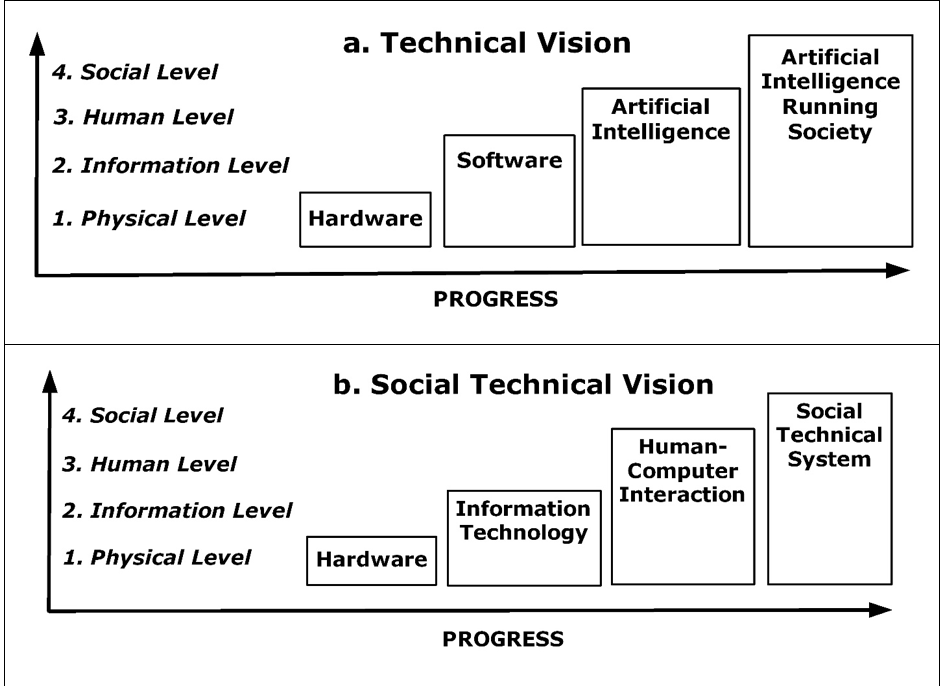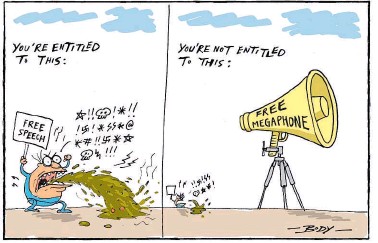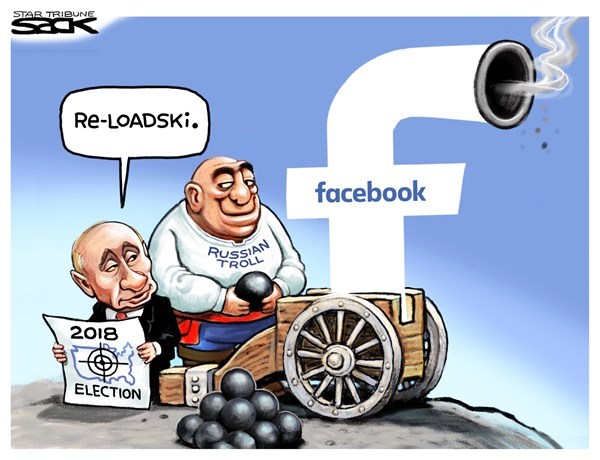A social-technical future. What use is technical progress without social progress? If people fighting with spears are given machine guns, how is that better? And if technology gives us nuclear bombs in suitcases what then? Giving savages advanced weapons is a recipe for disaster. The biggest threat to humanity today is us. We are the most dangerous animal on the planet thanks to technology but society keeps us in check. Our progress from hunter-gatherers fighting each other to rich global traders required social evolution. It is civilization that lets millions of people share electricity, water, roads, hospitals and shops without killing each other. Science advances by sharing information, as does the Internet. To see only technical progress is to ignore social progress and to look to technology to solve social problems is to look in the wrong place:
A man was looking for his lost keys at night under a lamp post. When asked where he lost them, he replied “Over there in the bushes – but the light is better here.” Trying to find the answer to social conflict in technology is just as foolish.
Like it or not, our future depends as much on social progress as it does on technical progress.
A comparison. Figure 7.6 compares a technical vision of the future and the social-technical vision, where the physical level (1) is the hardware we see and the information level (2) is software that emerges from it but follows different rules, as programming is not physics. The human level (3) is to information as software is to hardware, so again works by different rules. The social level (4) like the others emerges from the human level below. In Figure 7.6a, information technology ignores the human and social levels, believing that hardware and software alone will soon surpass them, but to give our future to algorithms is to abandon ourselves to the mindless and heartless. In contrast, a social-technical vision of Figure 7.6b sees the future as people harnessing technology, which like fire is a good servant but a bad master. Technology without people is less than useless, it is pointless, so the future is people and technology not technology alone.

People and computers are better than computers alone. Why tie up twenty-million-dollar super-computers to do what brains with millions of years of real life beta-testing already do? Even if we made them work like the brain, say as neural nets, they could well inherit the same weaknesses. Unleashing the power of the Internet requires a more humble conception of what technology can do, to change the goal from trying to mimic people to helping them. The benefits are evident, as while robot cars are still on trial, reactive cruise control, range sensing and assisted parallel parking are here now. While computer surgery struggles, computer-supported remote surgery and computer-assisted surgery work now. While robots are learning to walk down steps, people with robot limbs can be better than able. While computer drones are a liability, remotely piloted drones are an asset. Computer generated graphics are good but state-of-the-art animations like Gollum in the Lord of the Rings combine human actors and computers. The TV show Robot Wars is people plus robots not robots alone. Even on an 8×8 board, centaur chess players plus computers beat computers alone:
“The chess machine Hydra, which is a chess-specific supercomputer like Deep Blue, was no match for a strong human player using a relatively weak laptop. Human strategic guidance combined with the tactical acuity of a computer was overwhelming.” Kasparov, The Chess Master and the Computer, 2010
It is time to think man plus machine rather than man vs machine, that technology can advance with people rather than over them. All killer applications, from email to social media, succeeded by adding what people do best to what technology does best, letting computers handle the information and people manage meaning. The World Wide Web mainly made Internet links meaningful to people. The mobile phone was as much about making small screens usable as technical miniaturization. Google made search simple and used algorithms that made results relevant. Social media flourished by making human relations easier. That technology works better with us than without us is doesn’t downplay it, but says that to see the Internet only in technical terms is to underestimate it. To a savage, a mobile phone is a lump of metal not a world of information. Likewise today, the Internet is not a hardware platform but a social platform. And thanks to technology, social problems that have plagued society for generations are now hugely magnified.
Technology magnifies social problems. Whereas once I could only offend the people around me, today thanks to Twitter I can offend thousands, as Roseanne Barr discovered. Ideologies of death like ISIS that were once confined to backward states, today find a global audience. Technology magnifies effects in the information age as it did in the industrial age. Last century, nuclear bombs magnified war but it was left to people to resist them. Clever people like von Neuman and Bertrand Russel advised the US to lay waste to Russia before it developed atom bombs, but ethics not game theory logic stopped the brutal killing of millions. Today, the Internet magnifies social problems like hate and lying that, like war, have only hurt us in the past. Those who once waged physical wars today wage information wars. Again technology challenges humanity and again it has no answer. Only people can deal with social dilemmas.
Social problems require social solutions. The challenges facing the Internet today are social problems like hate and lying, where fake news is just a modern name for lies. Hate is wishing to harm to another and lying is saying what is not true. Both harm society because hate creates internal conflict and lies destroy the trust that lets people work together. The alternative is the golden rule, to help the social environment that supports us. So honesty and truth are “good” because they help society produce more, and racism, sexism, bullying, lying and stealing are “bad” because they harm society. Now that our social problems have migrated to the Internet, we need social solutions at the information level.

Understanding ethics. The Internet challenge is to understand what social means. If ethical people don’t get their ethics right they cant make the right choices, e.g. the strategy “When they go low, we go high” didn’t work because its like saying “When they go to war, we go to peace.” That didn’t work for Hitler either. One must oppose evil not ignore it. In this view, social is what benefits the synergy of society, so the social body is no more obliged to host what harms it than your body is obliged to host a disease. Freedom includes the freedom to hate, but it is not the freedom to spread hate. There has never been a right to incite hate. One is entitled to an opinion but not to use the megaphone of technology to spread it. People making sensible choices about who is in their domains isn’t censorship, it is the right to ban.
The right to ban. In 1984, New Zealand banned nuclear warships from its ports to express opposition to nuclear weapons. Despite a diplomatic protests, trade continued because free nations don’t have to harbor what they don’t agree with. The same applies today online when discussion boards choose not to harbor trolls. Banning is just asking someone to leave your place, which one is entitled to do. Online social platforms are no more obliged to harbor those who destroy their social fabric than planes are obliged to carry terrorists who want to blow them up. How foolish then for US technology to let Russian agents broadcast hate to interfere with their elections! This is software ignoring social effects. If the Internet is a garden of ideas, social platforms must weed out hate and lies or become echo chambers for conspiracy theories. Do not feed the trolls applies to Facebook and Twitter as it does to all of us. What then when social media act to undermine the society of which they are a part?

Are social media anti-social? America now knows that social media let foreign agents undermine their democracy in the 2016 election. In February 2018, it indicted 13 Russian citizens and entities like the Internet Research Agency for influencing elections by posting fake news on social media. Facebook let Russian trolls drop information bombs on American society. How did what was a tool to connect people become a tool to divide society on hot-button issues like abortion, religion and politics? To make a profit, Facebook invented targeted ads, the information version of a laser guided missile, where the laser is the AI software that analyzes messages and posts. When people post their likes, dislikes, feelings, political views and travel details, with pictures from all angles of their face, pets and family, they in effect create a dossier on themselves. This lets anonymous “information warriors” not only inject deceptive and hate-filled memes into their feed under the guise of “facts”, but also target them based on age, sex, location and political affiliation. They “weaponized” propaganda on a global scale, so what once helped the Arab Spring now helps the hate speech behind the ethnic cleansing in Myanmar. No surprise that weapon has now backfired on America. The original customers of Facebook, who create its content, are now its product. Facebook technology paints a virtual target on people’s back for its real customers, advertisers, and these new generation ads follow you around. Going into the business of selling people to advertisers turned Facebook’s platform of ideas into a platform of lies, and turning an information pipeline into an information sewer cannot be described as “doing good”.
What can be done? Is helping a foreign agents cyber-attack your country treason? Does how the attack is done matter? To say information war is not new is to miss the point – that it is harmful. It is a bad look so Facebook is responding, but too little, too late. Closing down sites just closes the stable door after the horse has bolted. Trying to “vet” sources is also futile, as agents can easily open a US shell company to buy ads to target people on divisive topics. Nor will labeling ads, as on TV, help. The right fix, to stop targeted ads, is not an option, so only fake fixes remain. Facebook has over two billion “users” and has bought 71 other companies including WhatsApp and Instagram. When something that big fails, only something bigger can stop it, and that is society. Society is slow to act, but its power to seize, imprison, fine and regulate are not to be trifled with. The question is now not what people want but what society wants, and it doesn’t want discord. To let dirty information infect people’s minds is no different from letting dirty water infect their bodies. When social media become anti-social the dog bites its master, and we all know what happens then.
The Internet is a mirror to humanity. Some say the Internet is making us stupid but online media just expose what we think. The Internet is just an electronic mirror that reflects us, so don’t blame the mirror if it looks bad. It is good because for humanity to change, it must first see itself. Today’s information wars are an opportunity to educate people to recognize and respond to hate and lies. To recognize them, look at the source, where information comes from. Know that one can refuse to harbor hate and call out lies. The temptation is to hate and lie too, but the enemy is not who we hate but hate itself, nor who tells lies but lying itself. Each of us has to think for ourselves, not cherry-pick “alternative facts”. As the Flemish mystic Jan van Ruysbroeck said in the fourteenth century when asked about the wickedness of the inquisition:
“We are what we behold, and we behold what we are.“
And those who saw devils then still see them today, with technology helping, e.g. if you Google “Dogs are bad” it gives reasons to hate them, while Googling “Dogs are good” gives reasons to love them (try it!). Humanity is now choosing what it thinks online with web-counters keeping the score. When people click, follow, like, friend, comment and post, they are creating the Internet. Technology is not evolving beyond us but is part of human social evolution, an experiment that has been ongoing for thousands of years. The Internet is helping humanity to upgrade itself by making that a necessity.